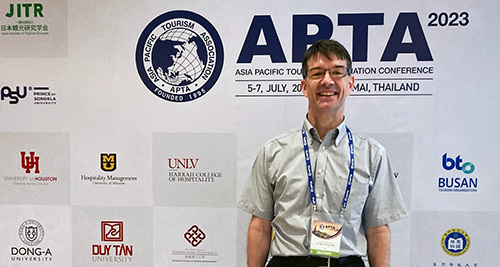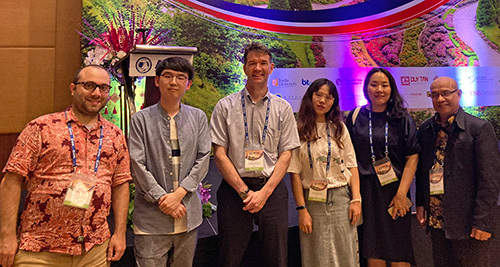
語学教育センターのデイビッド・ウィリアムズ教授による気候変動と日本の観光についてのプレゼンテーションがありました
ニュース
2023.08.08
2023年7月4日から8日にかけて第27回アジア太平洋観光学会 (APTA) がタイのチェンマイにて開催されました。学会には20カ国をこえる国々から200人もの研究者が集まり、アジア・太平洋地域における観光学研究の最新の取り組みが議論されました。城西国際大学からは語学教育センターのデイビッド・ウィリアムズ教授が参加し、気候変動と日本の観光に関する自身の最新の研究を発表、また世界中の研究者と意見を交わしました。
---
花見と紅葉狩りは、東京において年間を通して最も顕著な国際的文化的観光イベントである。しかし、こうしたイベントの季節的なタイミングや開催期間は、気候変動により変わってきている。観光は、一般的に目的地の気候により成立すると考えられているため、気候の変動があると観光客、観光従事者、そして観光のサステナビリティに影響がもたらされる。このため、東京のように気候変動の影響を受けている目的地における観光を理解するにあたり、観光気候は重要な指標となっている。
観光気候指数 (HCI:urban) を分析のツールとした本研究では、40年分のデータを利用し、東京における観光気候が花見シーズンでは「良い」から「とても良い」に改善している一方、紅葉狩りシーズンでは「とても良い」から「良い」に悪化しており、統計的に大きく変化していることを明らかした。こうした研究結果は、多角的なアプローチにより観光気候を観光意思決定政策に統合することで、観光資源のモニタリング、訪問者マネジメント、観光施設の適応、そしてポジティブな人間中心的介入を含めることの必要性を示している。
CLE Professor David Williams gave a presentation on climate change and tourism in Japan
The 27th Asia Pacific Tourism Association (APTA) conference was held in Chiang Mai, Thailand from July 4th - July 8th 2023. This year’s conference brought together 200 researchers from more than 20 countries to discuss and explore the latest initiatives in tourism research in the Asia Pacific region. David Williams from the JIU Center for Language Education presented his latest research on climate change and tourism in Japan at the conference and exchanged ideas with other researchers from around the world.
---
Cherry blossom viewing and autumn foliage viewing are two of the most significant cultural tourism events in Tokyo’s international tourism calendar. However, as a result of climate change the phenological timing and temporal extent of these events is changing. Since tourism is widely understood to be predicated on the climate of a destination, changes in climate will have an impact on tourists, tourism stakeholders and tourism’s sustainability. Measurement of the tourism climate has thus become an important metric to understand tourism in destinations, such as Tokyo, which are being impacted by climate change.
Using the Holiday Climate Index (HCI:urban) as the tool of analysis, the results from this 40-year longitudinal study indicate that statistically significant changes have taken place in Tokyo's tourism climate with conditions improving during the cherry blossom viewing period from 'good' to 'very good' but declining from 'very good' to 'good' during autumn foliage viewing. These findings imply tourism climate needs to be more fully integrated into tourism decision making policy through a multi-pronged approach to include resource monitoring, visitor management, facility adaptations and positive anthropocentric interventions.

